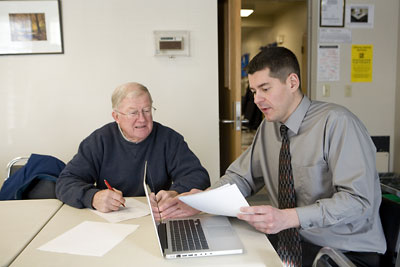Elderly can focus on 'gut feelings' to improve decision making
By Susan Lang and Andrew Reed

Many older adults experience decline in mental processes. But this need not be a handicap, because they largely can compensate by relying more on their strong emotional functioning, which doesn't decline with age.
According to Cornell psychologist Joseph Mikels, "One way older adults may be able to compensate for declines in memory and other important decision-making processes is through preserved emotional skills."
Mikels has been studying the role of emotion-cognition interactions in complex decision making, and how the quality of decisions can be improved across the adult life span. He has found that older adults:
- do not experience age-related declines in emotional processing.
- should trust their "gut feelings" when making decisions.
- prefer not to have too much choice.
Mikels, an assistant professor of human development in the College of Human Ecology, says that research suggests that older adults may differ substantially from younger adults in how they make decisions. As director of the Emotion and Cognition Laboratory, he conducts studies to examine how emotion interfaces with such cognitive processes as working memory and selective attention.
Mikels and others have found, in fact, that relying on emotion, rather than intensive deliberation, can play an important role in decision making. To determine whether older adults might benefit from a reliance on abilities that are spared from age-related declines -- namely emotional processing -- Mikels' research team presented older and younger adults with hypothetical health-related decisions (choosing a physician, for example), in which one of the alternatives was objectively superior to the others.
"When older adults relied on memory-based decision strategies, the quality of their decisions was quite a bit lower than their younger counterparts," Mikels said. "In stark contrast, when older adults relied on their gut feelings, the quality of their decisions was just as high as that of the younger adults."
|
Decision-making tips To help older adults make decisions, Mikels offers these suggestions: • Encourage them to go with their gut when appropriate and to focus on their feelings as opposed to the specific details. They may not only make better decisions, but also feel more satisfied with their choices. • Give them the amount of information they want, not how much you think they want. Ask them what they feel they can handle and/or prefer in terms of decision complexity. • Don't underestimate older adults' abilities. Most studies find little to no difference in the quality of decisions made by adults across age groups. • Just because seniors prefer simple decisions doesn't mean they cannot process complex ones. Research shows that older adults are more selective than younger adults in using mental processing and deliberation -- they consciously conserve effortful deliberation for major social and emotional decisions. "As we age, we start to make decisions in different ways. If older individuals don't seem to deliberate deeply over all of the details for a decision and tend to go with their gut, this strategy may be very adaptive, and you should encourage it," Mikels said. |
By focusing older adults' attention on their "gut feelings," Mikels was able to significantly enhance the quality of their decisions. Indeed, studies suggest that older adults may not only prefer to "go with their gut," but that their decisions may benefit immensely from doing so, Mikels said.
Mikels has also found that older adults prefer having less choice in decision making. In a series of large-scale surveys conducted with Cornell colleague Kosali Simon in Ithaca and New York City, hundreds of younger and older adults reported how many options they wished to choose from in a variety of domains, from prescription drug plans to ice cream flavors. Critically, older adults wanted, on average, half as many options as younger adults, and the older the participant, the fewer choices they desired.
In a separate study, Mikels and Simon measured self-reports of how much money older versus younger adults would be willing to pay for varying degrees of choice among prescription drug plans. Whereas younger adults were willing to pay increasingly more for additional options, older adults were not. In other words, Mikels' research suggests that excessive choice may be especially undesirable as we age, as it not only undermines the quality of decisions, but also people's motivation to choose anything at all. Individuals who are faced with dozens of options are less satisfied with their decisions than people who choose from relatively few options, even when the decisions appear as simple as selecting a variety of jam. And, evidence is now suggesting that this "choice overload" effect may be especially pronounced for older adults.
As such, Mikels said it would seem especially prudent to buffer older adults from these ill effects by tailoring decision environments more closely to their abilities and preferences.
Media Contact
Get Cornell news delivered right to your inbox.
Subscribe